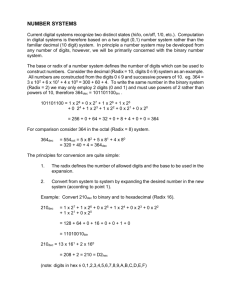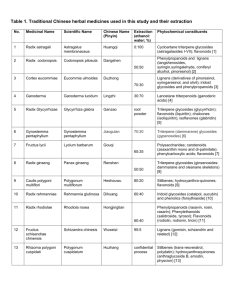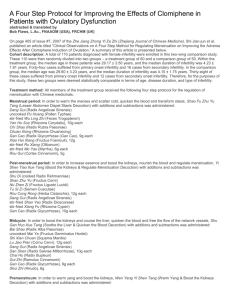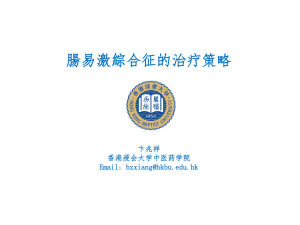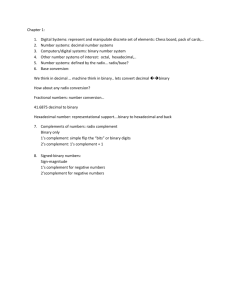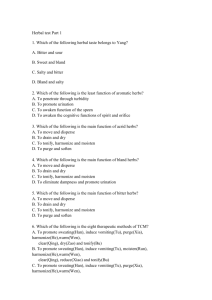Recurrent Miscarriage
advertisement
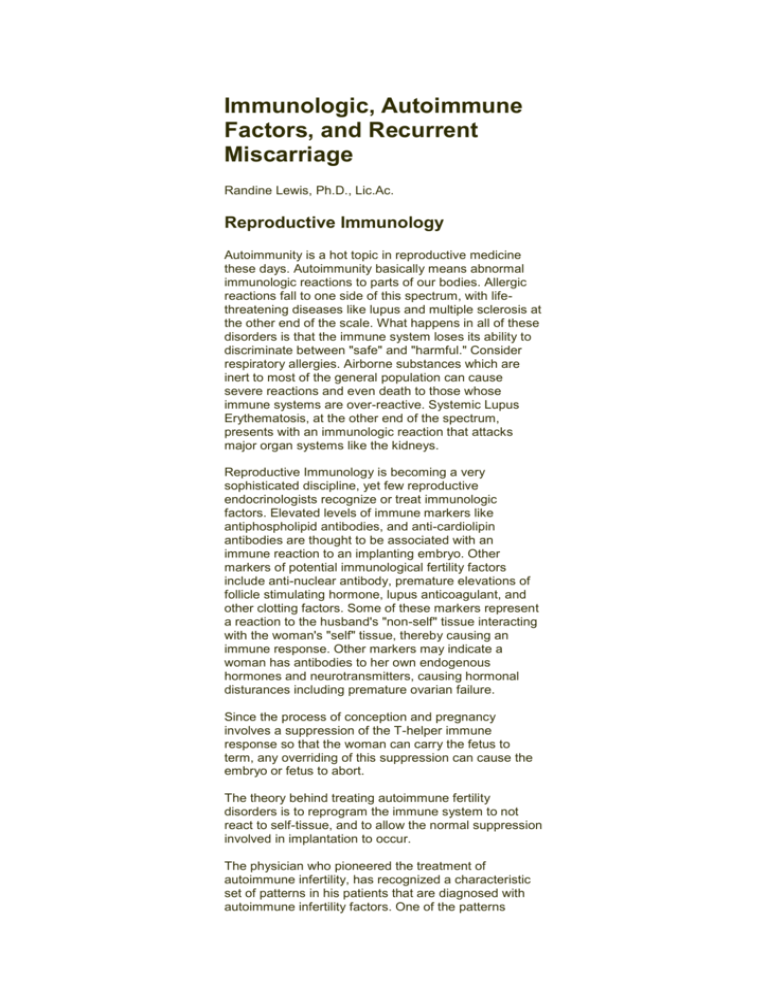
Immunologic, Autoimmune Factors, and Recurrent Miscarriage Randine Lewis, Ph.D., Lic.Ac. Reproductive Immunology Autoimmunity is a hot topic in reproductive medicine these days. Autoimmunity basically means abnormal immunologic reactions to parts of our bodies. Allergic reactions fall to one side of this spectrum, with lifethreatening diseases like lupus and multiple sclerosis at the other end of the scale. What happens in all of these disorders is that the immune system loses its ability to discriminate between "safe" and "harmful." Consider respiratory allergies. Airborne substances which are inert to most of the general population can cause severe reactions and even death to those whose immune systems are over-reactive. Systemic Lupus Erythematosis, at the other end of the spectrum, presents with an immunologic reaction that attacks major organ systems like the kidneys. Reproductive Immunology is becoming a very sophisticated discipline, yet few reproductive endocrinologists recognize or treat immunologic factors. Elevated levels of immune markers like antiphospholipid antibodies, and anti-cardiolipin antibodies are thought to be associated with an immune reaction to an implanting embryo. Other markers of potential immunological fertility factors include anti-nuclear antibody, premature elevations of follicle stimulating hormone, lupus anticoagulant, and other clotting factors. Some of these markers represent a reaction to the husband's "non-self" tissue interacting with the woman's "self" tissue, thereby causing an immune response. Other markers may indicate a woman has antibodies to her own endogenous hormones and neurotransmitters, causing hormonal disturances including premature ovarian failure. Since the process of conception and pregnancy involves a suppression of the T-helper immune response so that the woman can carry the fetus to term, any overriding of this suppression can cause the embryo or fetus to abort. The theory behind treating autoimmune fertility disorders is to reprogram the immune system to not react to self-tissue, and to allow the normal suppression involved in implantation to occur. The physician who pioneered the treatment of autoimmune infertility, has recognized a characteristic set of patterns in his patients that are diagnosed with autoimmune infertility factors. One of the patterns includes the syndrome of migraine headaches along with endometriosis - indicating possible vascular and blood flow abnormalities. Other countries in Asia and Europe have recognized endometriosis as an autoimmune disease for many years. Typically a woman who is suspected of having a blood component to infertility or habitual miscarriage is given daily doses of aspirin to "thin the blood" and thereby inhibit the clotting pathway. If this is not effective, heparin (another blood thinner) is employed in more severe cases. Because of the side effects of heparin therapy, it is not chosen as the first course of action in treating immunologic infertility. Intravenous immunoglobulin treatments are used by some physicians to treat severe autoimmunity, and steroids like prednisone are also used to suppress overactive immune systems. In ancient Chinese literature, a combination of the herbs Dang Gui (Angelica) and Chuan Xiong (Ligusticum Wallichii) , were given to women whose periods were late, to either help bring on the menses if she wasn't pregnant. If she was pregnant, these medicinals were to have no effect, and the pregnancy would go on. The important theory in this approach is that both Dang Gui and Chuan Xiong invigorate the blood. They have the same "blood thinning" effects as Aspirin and Heparin, but are a more natural and harmless approach. Thus, women who are suspected of having an immunologic reaction to the products of conception, might be treated with Dang Gui and Chuan Xiong if the symptoms indicate that there is a component of blood stasis in the uterus suspected in early pregnancy. These signs and symptoms might include uterine cramping, a history of dark, clotty menstrual flow, and a pulse whose quality is not smooth, and whose strength seems to come and go in either one or both wrists around the time of implantation and into early pregnancy. Serotonin is one of the chemicals involved in preparing the uterus for pregnancy. Some women are found to make antibodies to the serotonin in their blood. Dr. Beer, a Reproductive Immunologist from Chicago, Illinois, describes this subset of women with a group of common symptoms which he has noticed. These include: Fibromyalgia Increasing depression, irritability, and premenstrual symptoms Early morning insomnia Night sweats over the breastbone Panic attacks Thin uterine lining (less than 8 mm on days 13 or 14) Poor response to high levels of stimulating hormones like Fertinex, Pergonal, Repronex, or Gonal F Hormone levels that crash in the middle of the cycle In Traditional Chinese Medical diagnosis, the above symptoms correspond to a pattern of liver depression qi stagnation, yin vacuity with heart and liver fire. Once again, the particular pattern with which the individual presents must be addressed for full recovery, but a concomitant pattern which is likely to accompany this scenario would be irregular menstrual cycles and a sawthoothed, erratic basal body temperature chart. A practitioner of Traditional Chinese Medicine would instruct a patient with this presentation to practice stress-relieveing techniques like the qi-gong meditation, and daily exercises like walking. Eat frequent, small meals, to keep the blood sugar level more stable and inhibit the release of adrenalin. Sit down and relax during meals. Chew all food sufficiently, mixing enough saliva with the food to neutralize it and make digestion easier. Drink a lot of water, but don't drink during a meal. Do not drink alcohol or caffeine or smoke cigarettes. Incorporate the spleen vacuity dietary principles (see below). Eat foods which move the qi like peppermint, rosemary, spearmint, turmeric, and thyme. Perform the acupressure techniques to rectify the liver qi. Supplement with herbs which resolve liver qi stagnation, cool the blood, and supplement the yin. When pituitary and ovarian functions are imbalanced, the heart should be suspect, and if accompanied by other signs of heart disharmony, they should be addressed. One formula which has been used to calm the heart and liver, and can be incorporated into other prescriptions includes: Radix Glycyrrhizae Uralensis, Semen Tritici Aestevi Levis, and Fructus Zizyphi Jujubae. Other herbs which help to calm the spirit include Radix Salviae Miltiorrhizae, Ramulus Uncariae Cum Uncis, and Cortex Albizziae Julibrissin. Traditional Chinese Medicine has been treating autoimmune infertility for thousands of years. Modern Reproductive Endocrinology has only recognized the impact of immunologic factors for a few years. As with all Chinese Medical treatment, a proper diagnostic pattern must be established before treatment will be effective. The immune system will correct itself when the body is in balance. Many women with previously diagnosed "unexplained infertility" or autoimmune fertility factors have been effectively treated with diet and herbal therapy. According to the Eastern medical paradigm, it is not so important what the blood marker is, be it + ANA, +ACA, +APA, high FSH, or lupus anticoagulant. It doesn't matter if T cells are low or if natural killer cells are present in the uterus. What matters is the process which initially caused the immune system to go awry. We treat the root problem along with its manifestation, and the immunologic markers in the blood correct themselves. The Protective Qi Chinese medicine ascribes immunologic functions to an energetic aspect called the protective qi. This protective qi incorporates some of the functions of the spleen and lung systems. Any immunologic aspect, regardless of the physical or symptomatic manifestation, requires supplementation of the spleen qi. Herbs which strengthen the protective qi include Astragalus, Atractylodes, Codonopsis and Dioscorea. The mental process of overconcern and worry is said to damage the function of the spleen in Chinese medicine. Meditative techniques can assist in managing the concerns of everyday life and protect the function of the Chinese spleen. Dietary management is probably the most essential element in ensuring proper functioning of the spleen qi. Do not eat cold foods right out of the refrigerator or freezer, too many raw fruits and vegetables, no fruit juices. Do not overconsume dairy products, fats, oils, or sweets. An overabundance of wheat can also dampen and impair spleen functioning. Zhong Yi Fu Ke Lin Chuang Shou Ce (A Clinical Handbook of Chinese Medicine Gynecology) by Shen Shong-li, Shanghai Science & Technology Press, Shanghai, 1990, describes four patterns associated with Allergic and Autoimmune causes of Infertility as follows: Treatment based upon pattern discrimination 1. Phlegm dampness obstruction and stagnation Main symptoms: Inability to conceive after one year of unprotected intercourse, the woman may or may not be overweight; usually suffering from fatigue, lack of strength, low back pain, heavy lower legs, heavy dragging feeling, profuse vaginal discharge which is white in color and sticky and thick in consistency. There may also be no clinical symptoms except for a sticky, thick vaginal discharge and positive sperm (blood essence) antibodies. The tongue has thin, white coating and the pulse is fine but feels "slippery" or viscous, like there are ball bearings moving through it. Treatment methods: Fortify the spleen, dry dampness, and transform phlegm Formula: Rhizoma Atractylodis Cortex Magnoliae Officinalis Semen Coicis Lachryma-jobi. Radix Pseudostellariae Rhizoma Acori Graminei Bioe processed Rhizoma Arisaematis Radix Salviae Miltiorrhizae Flouritum Herba Epimedii Sclerotium Poriae Cocos Additions & Subtractions: If sexual desire is low, add Actinolitum 2. Blood Stasis Obstruction & Stagnation Main symptoms: Infertility several years after the woman was married, menstrual movement abdominal pain accompanied by blood clots. The tongue may or not be dark, with static macules on the edges of the tongue or darkened papillae, and the pulse will usually be taut or wiry, like a guitar string and "choppy" - comes and goes, roughly. Treatment methods: Rectify the qi, quicken the blood, and transform stasis. Formula: Experiential formula: Radix Salviae Miltiorrhizae Radix Rubrus Paeoniae Lactiflorae Semen Pruni Persicae Rhizoma curcumae Zedoariae Herba Oldenlandiae Diffusae Rhizoma Corydalis Yanhusuo Pollen Typhae Processed Radix Et Rhizoma Rhei Herba Cistanchis Deserticolae Radix Linderae Strychnifoliae Radix Aucklandiae Lappae mix-fried Radix Glycyrrhizae This would be the type of treatment for women with diagnosed endometriosis, who have the characteristic pelvic pain, clotty, dark menstrual blood, and infertility. They may have higher levels of circulating immunoglobulins found in their blood. European medical scientists recognize endometriosis as an autoimmune disease. 3. Yin vacuity, fire effulgence Main symptoms: Lack of conception after one year of unprotected intercourse, early menstruation, amount profuse, afternoon tidal fever, dry mouth, sore throat, constipation, red eyes, dizziness, tinnitus, low back pain, lower leg weakness, heart vexation, easy anger, thin, a red, dry tongue, and a fine, rapid pulse Treatment methods: Enrich yin and clear heat to bring the fire down Formula: Anemarrhena & Phellodendron Rehmannia Pills with Additions & Subtractions: Rhizoma Anemarrhenae Cortex Phellodendri Uncooked Radix Rehmanniae Rhizoma Alismatis Cortex Radicis Moutan Sclerotium Poriae Cocos Fructus Corni Officinalis Radix Angelicae Sinensis Radix Scrophulariae Ningpoensis Fructus Lycii Chinensis Fructus Ligustri Lucidi Cortex Eucommiae Ulmoidis Radix Gentianae Scabrae 4. Damp heat pouring downward Main symptoms: Lack of conception after one year of unprotected intercourse, profuse vaginal discharge yellow in color and possibly with a foul odor, early menstruation, amount profuse or diminished, possible obstructed downward movement, vaginal or rectal itching (especially premenstrually), insidious pain in the lower abdomen which increases with the menstrual period, low back pain, torpid intake, yellow, a red tongue with a slimy yellow coating, and a fine, slippery, and rapid pulse. Treatment methods: Clear heat, disinhibit dampness, and harmonize the constructive qi. Formula: Experiential formula: Caulis Sargentodoxae Herba Patriniae Heterophyllae Cum Radice Semen Coicis Lachryma-jobi Radix Dioscoreae Oppositae Caulis Milletiae Seu Spatholobi Radix Rubrus Paeoniae Lactiflorae Ramuluss Lonicerae Japonicae Fructus Meliae Toosendan Rhizoma Corydalis Yanhusuo Uncooked Radix Glycyrrhizae Beyond the use of herbal formulae to treat immunologic reactions, some health care professionals have recommended the use of PABA (para-aminobenzoic acid) to treat immunologic factors affecting fertility. PABA is a natural substance which is related to the Bvitamins. It is also used topically in sunscreens. PABA effects the formation of red blood cells, protein metabolism and stimulates the production of folic acid in the intestines. Supplementation with 300 - 400 mg. of PABA daily has been found to prevent or correct aspects of certain autoimmune diseases like Crohn's disease, ulcerative colitis, scleroderma, and infertility. PABA is found naturally in organ meats like liver, eggs, rice, wheat germ and bran, molasses, and dark green vegetables. Make sure you include antioxidants (vitamins C, E, beta carotene, selenium, zinc) and super-antioxidants (grape seed extract, pine bark extract, red wine extract, bilberry extract). Ensure the bulk of your diet consists of whole, organic foods. Supplement with green foods, microalgae, flower pollen and royal jelly. Include Reishi and Shitake mushrooms, and Kombucha tea. Drugs like Cortisone, Prednisone, Prednisolone, Dexamethasone, and Methylprednisolone, are glucocorticoid medications which are used to inhibit immunologic reactions within the body. All these medicines would be categorized in Chinese medicine as exterior resolving medicinals. Just as Chinese herbal exterior resolvers can deplete the essence, so may glucocorticoids if used in abundance. Their known side effects include insomnia and anxiety as the essence is being depleted. Increased appetite and water retention result from disturbances in the yang qi. If spleen qi and kidney yin are problematic to begin with, glucocorticoids will exacerbate this deficiency. One complication from long term use of glucocorticoids is avascular necrosis of the bones of the hip, the talus and the navicular. This is because the blood supply of these bones is diminished. Recall that the kidney system provides essence for bone growth. Essence and blood share a common source, and when one is compromised, so is the other. Those with qi vacuity and kidney yin vacuity therefore, should be wary of long term glucocorticoid administration as it in itself, may damage the ability to conceive. Another negative consequence of overuse of antibiotics, glucocorticoids, and birth control pill brings us to our next topic, that of yeast syndrome. Yeast Many patients are overprescribed antibiotics for conditions which may not warrant their use, but we have come to rely on them as a treatment for many conditions. Antibiotics are often prescribed for respiratory and stomach viruses, on which they have no effect. Antibiotics kill bacteria. That's all, nothing more. They kill the intestinal bacterial flora, which keeps commensurate organisms like yeast, in check. Most women can relate to the experience of developing a vaginal yeast infection after a bout of antibiotics. Candida albicans are yeast which occupy the large intestine, and whose function it is to clean up cellular debris. Candidiasis is an overgrowth of intestinal yeast. When the yeast proliferate beyond their saprophytic role, they can wreak internal havoc. When the intestinal wall becomes permeable to their infiltration, they can enter the bloodstream as well, and cause all kinds of endocrine and immunologic problems. Gastrointestinal signs include indigestion, gas, and bowel irregularites like constipation and diarrhea. Symptomatic evidence of overproliferating candida albicans includes vaginitis, sinusitis, certain skin manifestations and oral thrush. Fatigue and depression are commonly involved. Accompanying disruptions in the menstrual cycle provide evidence of hormonal corollaries. Since the endocrine system regulates the immune system, the cycle becomes more vicious. Diet An anti-candidal diet can help individuals with yeast overgrowth return to a normal state of health. The (Chinese) spleen is always involved. Consume plenty of organic vegetables. Eat brown rice as the staple grain. Tofu and tempeh are good staple foods. Consume only organic, hormone-free meats are. Do not eat (dairy) cheese. Avoid yeast breads, and all forms of alcohol, vinegar and fermented beverages. Avoid sweets, on which yeasts thrive. Avoid refined carbohydrates, which almost immediately turn into glucose within the body. Do not consume sugary fruits which mold easily. Apples and pears are alright. Do not drink fruit juices. Acidophilus supplementation helps to repopulate the bacterial flora and control the yeast. Active-culture yogurts contain acidophilus as well, but the dairy product in which it is housed usually promotes a condition of dampness, which can damage the spleen. Herbs which have an antimycotic nature include Rhizoma Coptidis Chinensis, Radix Scutellariae Baicalensis, Cortex Phellodendri, Radix Sophorae Flavenscentis, Cortex Radicis Dictamni Dasycarpi, Hera Houttuyniae Cordatae, Semen Cnidii Monnieri, Semen Arecae Catechu, and Fructus Meliae Tossendan. Herbs which are supplementing and also help cleanse the blood of toxins include Radix Angelicae Sinensis, Radix Albus Paeoniae Lactiflorae, Radix Astragalus Membranacei, Radix Polygoni Multiflori, and Cortex Radicis Acanthopanacis. Following strict adherence to this diet and herbal regimen, it is possible to experience a die-off phenomenon known as a Hirxheimer reaction, characterized by feverish, flu-like feelings, headaches, nausea, vomiting, and diarrhea. These symptoms, which are histamine induced, should not last more than one to two days. Antihistaminic herbs include Rhizoma Zingiberis, Fructus Amomi, Fructus Cardamomi, Rhizoma Alpiniae Officinari, Semen Alpiniae Katsumadeae, Rhizoma Atractylodis Macrocephalae, and Rhizoma Atractylodis. Take rhubarb (Radix Et Rhizoma Rhei) to help purge the bowels and rid the body of the toxic buildup. When these symptoms subside, the symptoms caused by yeast overgrowth should be alleviated. Claudia's Ordeal Claudia and her husband Jerome, both age 37, had been married for four years. They were an adorable couple. Claudia was petite and sophisticated and Jerome was handsome and humorous. They were devout Catholics who desperately wanted a family, and would have made the best parents. Unfortunately, Jerome's sperm analysis revealed an overall low sperm count, marginal motility, and very poor morphology (88% abnormal forms.) He was diagnosed with a slight varicocele. Claudia had been diagnosed with endometriosis, but was told she was otherwise fine. She had previously undergone a full fertility workup, laparoscopy, six unsuccessful Clomid cycles, three hormonally stimulated intrauterine inseminations, and one failed IVF treatment. They experienced difficulty with their decision to try assisted reproductive techniques because of the religious aspects, but were told it was their only hope because of Jerome's sperm quality. They were tired, frustrated and frantic for answers. Claudia and Jerome scheduled separate appointments and I treated each of them weekly. Jerome was a corporate lawyer, and suffered from intense stress and tension headaches. He had difficulty sleeping, and had been prescribed sleeping aids. He lived on a diet of non-steroidal anti-inflammatories to control his headaches. I gave him a list of supplements to purchase (Vitamins A, C, E, selenium, zinc, L-Arginine and L-Carnitine), and I treated him for his headaches, which were caused by stress manifesting as liver depression, qi stagnation with depressive heat. Within two weeks his headaches were gone, and he could function without headaches and sleep disturbances. I quit treating him. His next sperm analysis, six weeks later, was normal! Jerome never used herbs nor went under the knife. He dealt with his stress, was treated for his headaches, and he quit taking his ibuprofin and ambien. His sperm quantity and quality improved on its own. They were hopeful. Claudia, a flight attendant, suffered from very severe PMS. About a week before her period was expected she became extremely depressed and irritable. She experienced lower back pain and abdominal cramping up until her menses arrived. Then she spent one full day in bed with a heating pad and her own ibuprofen and coke cocktail. Her menses were regular, coming every 30 - 32 days. She bled rather heavily, and the menstrual blood was dark red and clotty. She was always cold, especially her feet. She had occasional itchy vaginal discharge that was exacerbated after intercourse. She had already eliminated caffeine and alcohol, and ate a fairly healthy diet, except for her monthly menstrual coke. Her pulse was full and taut, like a vibrating metal guitar string. I prescribed two herbal formulas, one during the follicular phase to tonify the yang aspect of her kidney and clear damp-heat, and a luteal phase formula to clear the liver, rectify the qi and invigorate the blood. We supplemented the herbal therapy with weekly acupuncture treatments. Although Claudia didn't modify her diet, she supplemented with acidophilus capsules to control the yeast infections she thought she was experiencing. Within three months the menstrual pain and premenstrual irritability was greatly improved. She still had not conceived, however. In their desparation, the couple sought out another reproductive endocrinologist for further treatment. She was told to quit taking herbs. One more laparoscopy was performed, and very little new endometrial tissue was found in the abdominal cavity. Both Claudia and Jerome were found to carry and exchange a bacterial infection called ureoplasma, which was blamed as the culprit for implantation failure. They were jointly prescribed antibiotics for one month, after which another hormonally stimulated insemination was performed. They still did not become pregnant. Their road toward conception was becoming more treacherous. Claudia returned for treatments. Her symptoms had not worsened in the interim, but the vaginal itching never ceased. We discussed the potential immunologic nature of her implantation failure, and I prescribed the formula (above) to clear damp heat, and modified with liver rectifying herbs like bupleurum. During one visit, Claudia off-handedly told me that every month she experienced vision changes premenstrually. She had told her gynecologist and reproductive endocrinologist that her vision would dim and she saw floaters just before her period arrived, and they both told her it was insignificant. According to Chinese medicine, the liver, which governs the eyes and vision, also supplies blood to the uterus. This clue allowed me to hone in on another aspect of Claudia's menstrual disharmony. Although the liver qi had been rectified, the liver blood remained relatively vacuous and couldn't supply both the eyes and the uterus. I further modified her formula to include Lycium and Paeoniae Albus after ovulation. The floaters went away. Meanwhile, however, the clock was still ticking, and Jerome and Claudia, now 38, decided to go out of state for reproductive immunologic treatments. Claudia received a more complete laboratory analysis of immunologic factors, and started treatment for another IVF. (She again was advised to stop the herbs.) This time, in addition to her hormonal stimulation, she was prescribed a blood thinner, Lovanox, intravenous immunoglobulin injections, and the steroid Dexamethasone. Her blood analysis revealed that she had conceived this cycle, but 12 days after the embryo transfer, her beta-hCG was negative and she got her period. At least hopeful that her uterus had allowed implantation, they geared up for another cycle. Same treatment, same result. The first blood test was positive for pregnancy; the second negative. The road toward parenthood had become more than treacherous now. It was looping back around itself, with more forks and dead ends. They were deeply lost in the maze. More complex lab work revealed that Claudia and Jerome's DNA was so similar that Claudia's immune system was unable to mask the presence of the implanting conceptions. Her body, thinking these invaders were harmful, were rejecting their embryos. The PMS and depression had returned, now in the form of despair. Claudia resumed acupuncture treatments because she wanted to feel hopeful again. One last modification to the herbal formula, incorporating treatments for liver blood vacuity, liver qi stagnation, and damp heat, threw Claudia's body into balance within weeks. She never had another period. In utter disbelief, Jerome and Claudia discovered they had become pregnant - naturally. They never had to hear another nurse's voice over the phone tell them they were unsuccessful yet again. They experienced the joy of discovering the appearance of the double line on a home pregnancy test. (All further laboratory tests during Claudia's pregnancy were normal.) Laura's Failing Ovaries Laura was 38 when she first consulted me. She had been pregnant twice before, both through hormonally stimulated inseminations. She miscarried the first at nine weeks, the second at seven weeks. On each occasion, the pregnancy seemed to be going fine, but during her ultrasound scan, she found that the embryo quit growing. She received the dreaded pronouncement that her FSH levels were high, and was given the diagnosis of premature ovarian failure. She was told that her ovaries had quit responding to hormonal stimulation, and therefore the quality of her eggs was poor, resulting in poor quality embryos. After her last miscarriage, her FSH was found to be 29 on cycle day 3. Her periods ceased, and her body was immediately thrown into seeming menopause. She sweated all the time. She was always tired because she was so hot and miserable at night that she couldn't sleep. She was experiencing heart palpitations, general irritability and lethargy. She reported vaginal dryness, but wasn't overly concerned because her libido was nonexistent. Just before she came to see me her FSH was 98 and she was given a prescription for hormone replacement therapy. Laura's hands were ice cold. Her skin was moist and clammy. Her pulse was very frail, almost undetectable, and her tongue was bright red and quivered. She had a classic presentation of spleen qi and kidney vacuity with deficient heat in the heart. She was sweating out all of her fluids, which made her hot, dry and miserable. I knew she would respond better to herbal therapy, and saw her in the clinic every two weeks for herbal modification. I prescribed raw herbs for Laura, which are stronger than the powdered concentrates. She said she would do anything! I prescribed a formula consisting of Concha Ostrea, Radix Astragali Membranacei, Radix Ephedrae, Semen Tritici Aestivi Levis, and Radix Rehmanniae Glutinosae. She boiled up the ingredients daily and drank the resulting tea. She reported that although it tasted and smelled less than appealing, her body began to crave it. Within a month her sweating stopped, she was sleeping and feeling better. Her vaginal discharge returned, and two weeks later she had a period. Within three more weeks the vaginal discharge appeared to be the clear, fertile type that she remembered, and she used an ovulation kit which turned markedly positive. She became pregnant but soon after she started to experience fever like sensations, which would result in profuse sweating from her chest. She recalled that she felt this way when she previously miscarried. She was still drinking her herbal tea, but had cut down on it dramatically. I urged her to continue - that it was more important now than ever, but I modified the prescription to clear heat from the heart. The herb Radix Scutellaria clears heat from the upper body, and also has an empirical effect of "calming the fetus" to prevent miscarriage. She came for acupuncture treatments every week throughout the first trimester, and then returned only for assistance in preparing for labor. She is the proud mother of a healthy baby girl. Recurrent Miscarriage There is no more devastating event than the loss of a pregnancy - at any stage - especially after suffering from fertility impairment. Women who experience this loss suffer through the stages of grief as if they have lost a loved one. They have. It is a continuum; the most overwhelming loss a woman can experience is the loss of a child she has given birth to. Next is the loss of a child which she has carried within her womb. Next, but still devastating, is the loss of the potential child every month when her period comes. Many miscarriages can be avoided. Those which result from frank genetic defects and fetal developmental failures cannot and should not be thwarted. Those due to maternal reactions are preventable. Numerous pregnancy losses are due to the same immunologic factors and hormonal imbalances which prevent pregnancy from occurring in the first place. These are the women who receive dismal results from their western medical caregivers. The most common reason for early pregnancy loss is the same as luteal phase defect - inadequate progesterone production. Incorporating the treatments addressed specifically for the pattern which underlies the progesterone deficiency, be it kidney yang or spleen qi vacuity, will also enhance the ability to carry the pregnancy until it takes over its own hormone production. Herbs which have the inherent effect of improving progesterone production and preventing miscarriage (prescribed only for the proper pattern diagnosis) are: Atractylodes, Astragalus, Codonopsis and Dioscorea for spleen qi vacuity. Eucommia Ulmoides, Dipsacus, Loranthus and Cuscuta are used for kidney vacuity. Polygonum Multiflorum and Gelatinum Corii Asini are employed for blood vacuity symtoms. Radix Scultellaria Baicalensis clears heat from the upper part of the body and prevents miscarriage. Some pre-made formulas for miscarriage prevention consist of: Qi Vacuity with Stagnation Protect The Fetus and Aid Life Formula Radix Ginseng Rhizoma Atractylodis Macrocephalae Sclerotium Poriae Cocos Radix Glycyrrhiaze Uralensis Radix Dioscoreae Oppositae Semen Dolichoris Lablab Semen Nelumbinis Nuciferae Semen Coicis Lachrymi Jobi Fructus Amomi Kravanh Herba Agastaches seu Pogostemi Rhizoma Alismatis Orientalis Fructus Hordei Vulgaris Germinantus Radix Platycodi Grandiflori Pericarpium Citri Reticulatae Fructus Crataegi Rhizoma Coptidis Semen Euryalis Ferocis Cold Uterus Warming the Womb Decoction Rhizoma Cyperi Rotundi Folium Artemisiae Argyi Radix Angelicae Sinensis Radix Astragali Membranacei Fructus Evodiae Rutaecarpae Radix Ligustici Wallichii Radix Paeoniae Lactiflorae Radix Rehmanniae Glucinosae Cortex Cinnamomi Cassiae Radix Dipsaci Asperi Radix Dipsaci Asperi Supplements Spleen Qi and Blood, Calms the Fetus Powder that Gives the Stability of Mount Tai Radix Ginseng Radix Astragali Membranacei Radix Dipsaci Asperi Radix Scutellariae Radix Ligustici Wallichii Radix Rehmanniae Glucinosae Conquitae Radix Paeoniae Lactoflorae Rhizoma Atractylodis Macrocephalae Radix Glycyrrhizae Uralensis Fructus Amomi Blood Stasis Powder that Gives the Stability of Mount Tai Cinnamon Twig and Poria Pill to Dispel Blood Stasis in the Womb During Pregnancy Ramulus Cinnamomi Cassiae Sclerotium Poriae cocos Radix Paeoniae Cortex Moutan Radicis Semen Persicae Christine's Losses Christine was 31, and had just moved to Houston the week before her phone call to me. She and her husband had just driven from Colorado, after Robert, a freelance photographer, was offered a job by a friend. They had no health insurance, and were very low on funds. She was referred to me by a midwife she had called, for "shoulder pain." I told her I would have to refer her to a colleague, as I only treated fertility and related conditions. She blurted out, in tears, that she was also in the process of rejecting her sixth pregnancy. I told her to come in immediately. She took a cab to my clinic within fifteen minutes. She was pale and white, and even her lips were lacking color. She looked like she was in shock. She just found out she was pregnant before they left Colorado. She had been pregnant five times previously, once when she was a teenager, and four times over the last two years. Each time the story was the same: she missed her period, went in to the clinic for blood tests to assess beta-hCG and progesterone levels, which were adequate and rising as they should. About two to three weeks later, she would get severe cramping. She was given supplemental progesterone and minerals and advised to remain on bedrest, but the cramps continued to worsen in intensity, only to be followed the next week by bleeding. This time the contractions had just begun. She was five weeks pregnant, and her right shoulder was extremely painful. She seemed almost in denial about the presence of the uterine cramping, as if she couldn't survive another miscarriage. She focused only on the pain in her shoulder. I put a few needles in the shoulder area, and as the pain resolved she relaxed. She then became acutely aware of the uterine cramping and started sobbing. Her pulse had the classic quality of pregnancy - rolling and slippery in the kidney position, but the quality would come and go. During a contraction the pulse was undetectable. When it returned it was choppy and uneven. Her tongue was pale, but dark and dusky in color. Although invigorating the uterine blood can be risky during pregnancy, when blood stasis is present, if it isn't addressed and resolved, the fetus will abort. I switched the focus of the acupuncture treatments to resolving blood stasis in the uterus and rectifying the qi. Her color returned almost immediately and the cramping diminished. I brewed her a cup of cinnamon twig and poria decoction to resolve blood stasis in the womb during pregnancy, and she drank two cups. The contractions stopped. We talked at length about what her body was going through, and I told her based upon my experience, I thought she was rejecting her pregnancies. I advised her to come in for treatments at least three times per week, and drink the herbal tea three times per day, more if the contractions returned. She told me she had very little money, so we agreed on a lesser payment as she could afford for one weekly treatment, but I would still see her as often as was necessary. She came in every other day for two weeks. She drank the tea without fail, and her pregnancy continued. Christine returned at five months pregnant as the contractions were resuming. I treated her twice per week, and she obtained her own herbs. She carried her son to eight and a half months, and gave birth at home. The herbal formula I prescribed for Christine is often used to treat endometriosis and uterine fibroids, and other manifestations of uterine blood stasis. It also has the empiric effect of lowering certain immunologic factors in the blood. Although she did not have a history of these conditions, her treatment was based solely upon her pattern presentation. Whatever the cause of her previous miscarriages, the root imbalance had been resolved.
